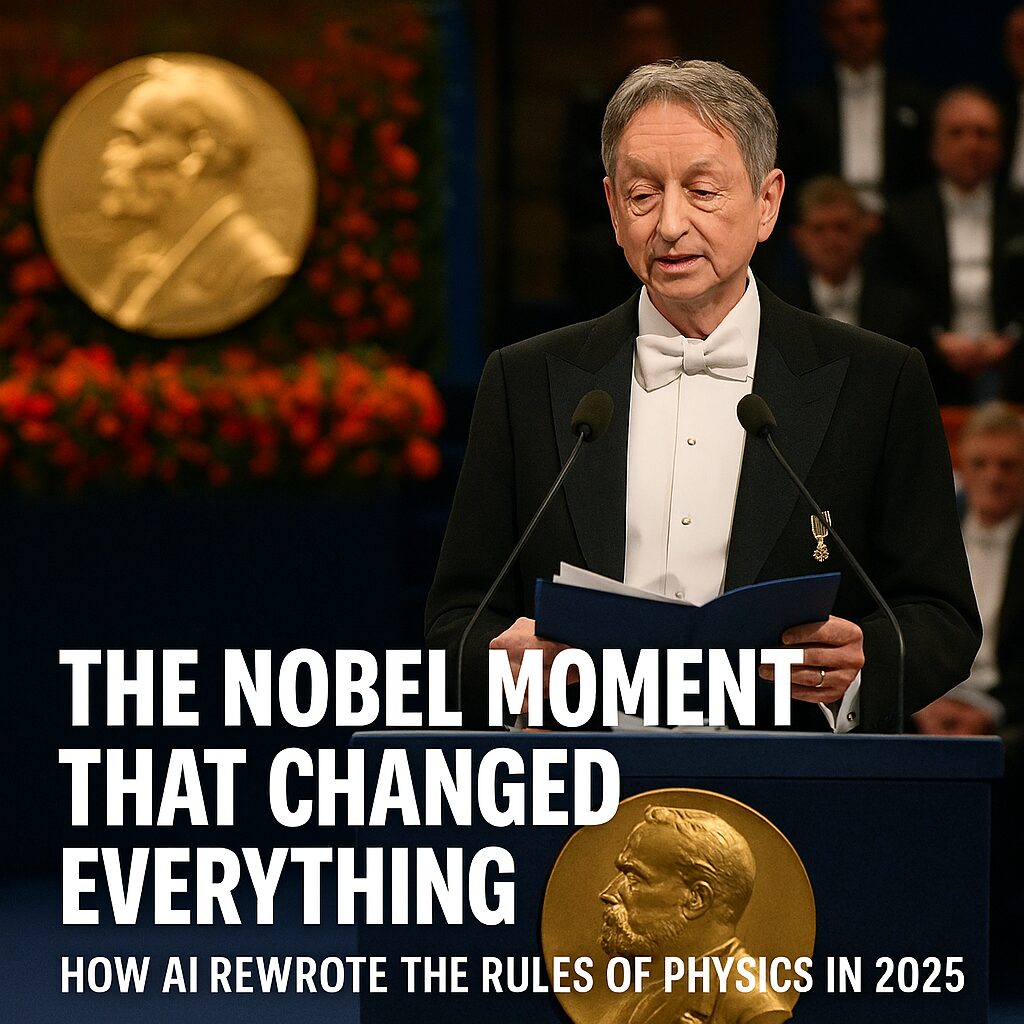Introduction
In a landmark moment for science and technology, the 2025 Nobel Prize in Physics was awarded to two pioneers of artificial intelligence: Geoffrey Hinton and John Hopfield. Their groundbreaking work on neural networks and machine learning laid the foundation for modern AI systems, including generative models and autonomous reasoning engines. This marks the first time the Nobel Committee has honored research that directly enabled AI-generated scientific discovery, signaling a new era in physics and computation.
🧬 Who Are the Laureates?
- Geoffrey Hinton: Often called the “Godfather of AI,” Hinton’s work on backpropagation and deep learning revolutionized neural network training. His development of the Boltzmann machine enabled machines to autonomously extract patterns from data.
- John Hopfield: Creator of the Hopfield network, a form of associative memory that allows systems to store and reconstruct complex patterns. His 1982 model became a cornerstone for neural computation.
Together, their contributions underpin the architecture of today’s AI systems—from ChatGPT to protein-folding algorithms.
📊 Why This Nobel Prize Is Historic
| Milestone | Impact on Science and Society |
|---|---|
| 🧠 Neural Network Foundations | Enabled deep learning and generative AI models |
| 🔬 AI-Driven Discovery | Accelerated breakthroughs in physics, biology, and medicine |
| 🧪 Autonomous Research Agents | Machines now generate hypotheses and simulate experiments |
| 🌍 Societal Transformation | AI tools now influence healthcare, education, and governance |
This Nobel Prize recognizes not just theoretical physics—but the fusion of computation, cognition, and creativity.
⚠️ Ethical Reflections from the Laureates
Both Hinton and Hopfield expressed excitement and concern:
- Hinton warned that AI may “exceed people’s intellectual ability,” comparing its impact to the Industrial Revolution.
- Hopfield emphasized the dual-use nature of AI, likening its risks to nuclear energy and viral research.
- The Nobel Committee acknowledged the “enormous benefits” of AI, while urging ethical responsibility in its deployment.
This moment isn’t just about achievement—it’s about accountability.
🌐 Global Reactions and Future Implications
- Scientific institutions hailed the award as a validation of interdisciplinary research
- Governments and regulators renewed calls for AI safety frameworks
- Tech leaders celebrated the recognition of foundational AI science
- Educators and students embraced the shift toward AI-integrated curricula
The 2025 Nobel Prize in Physics may inspire a new generation of physicists, coders, and ethicists.
🔍 SEO Optimization Summary
✅ Meta Title: “First AI-Generated Nobel Prize Winner: Physics 2025 Breakthrough” ✅ Meta Description: “Explore how Geoffrey Hinton and John Hopfield won the 2025 Nobel Prize in Physics for foundational AI research. Discover the impact on science, ethics, and society.” ✅ Keywords: Nobel Prize Physics 2025, AI-generated discovery, Geoffrey Hinton Nobel, John Hopfield neural networks, AI in physics ✅ Formatting Tips:
- Use structured headings (H1–H3)
- Include tables and bullet points for readability
- Embed alt text in visuals (e.g., “Geoffrey Hinton receiving Nobel Prize for AI research”)
Conclusion
The 2025 Nobel Prize in Physics is more than a recognition of past achievements—it’s a signal of the future. As AI systems begin to generate knowledge, simulate experiments, and challenge human intellect, the boundaries of science are being redrawn.
This Nobel isn’t just for Hinton and Hopfield. It’s for every researcher, coder, and thinker shaping the age of intelligent machines.

